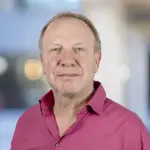Dick Douwes holds the chair Global History, with particular reference to the Middle East.
Current project
Shrine Politics: Sacred Space and Public Religion in Syria and Lebanon
The most widespread network of shrines attracting diverse audiences are those dedicated to the sometimes overlapping saintly entities of Nabi Khidr (Islamic), Mar Jurjus (Orthodox Christian, St. George) and Mar Ilyas (Prophet Elijah, Jewish but also Christian and Islamic). These and other saintly entities are the embodiment of an awareness of shared sacredness, transcending communal, as well as national borders. In contrast to formal religious institutions of assembly, such as mosques, churches and synagogues, shrines attract a more varied audience in terms of gender and age. Larger shrines often function as community centres offering social services. Shrines function next to and in association with formal religious institutions. Nonetheless, the veneration of saints is contested, both by secular and fundamentalist voices. In past and present war conditions many shrines in the region have been subjected to violence. Yet, saints and shrines, however contested, continue to offer space for communal and intercommunal exchanges, for alignment within and between.
This project studies shrines as historical sites of negotiation of communal heritage and present-day agency. Minority communities engaged in the refurbishment and expansion of sacred sites over the last decades, partly as a consequence of emergent religious tourism (Christians from the western diaspora and Shiites from Iran and Iraq). For communities that are not part of public religion, shrines (not mosques or churches) constitute their main material and spatial expression. In an effort to address various ‘orthodox’ concerns about these ‘heretical’ sites, various shrines have been cleansed of more overtly ‘superstitious’ artefacts and rituals, such as the use of ‘magic’ salt and of blessing stones.
This project is embedded in the Center for Global Heritage and Development and developed in cooperation with the Swedish Research Institute in Istanbul (SRII) and the Finnish Institute in the Middle East (FIME, Beirut).
Upcoming project
Middle Eastern Refugees’ Heritage: Recreating the Past to Prepare for the Future
Heritage and memory provide tools to connect to the past, to accommodate to conditions of diaspora and to prepare for a post-war in the Middle East. This project aims to study the ‘mobile’ heritage of refugees; artifacts - many material carriers of memory having been lost in war and dislocation -, social media texts and images, and memories that they carry with them, that they share and find relevant for future purposes, be it in the setting of a continued existence in asylum, but most particularly in view of the post-war possibility of return and of contributing to reconstruction and reconciliation.
Memories and expectations are individually distinct, yet some patterns appear to be more common. Refugees from the warzones in the Middle East bring with them traumatic memories of war and displacement. Yet, many share ‘good memories’ of the period before the war and are proud of Syria’s impressive heritage and its contributions to mankind (first wheat growers, first cities, first alphabet, first music annotation, etc.) as well as of Hellenistic past, linking them to Europe. However, most good memories are about family life, friends, fellow students, colleagues, work and leisure. Bad memories often remain silenced, sometimes for the sake of keeping/creating harmony among the refugees themselves, sometimes out of fear of possible negative consequences that may harm their family and relations in Syria, or in view of their possible return.
This project is currently developed in cooperation with the Center for Global Heritage and Development.
Societal outreach
Making information available to the broader public about the variation within Islam, within Muslim societies and communities is a vital aspect of scholarly work. Dick Douwes has published various articles, opinion pieces and books, such as the much read paperback De islam, een kleine geschiedenis (Islam, a short history) (2016).
Contact

- Email address
- douwes@eshcc.eur.nl
- Phone
- +31 10 408 2497
- Room
- M7-34
- Space
- Van der Goot Building
- Address
- Burgemeester Oudlaan 50
3062 PA
Rotterdam